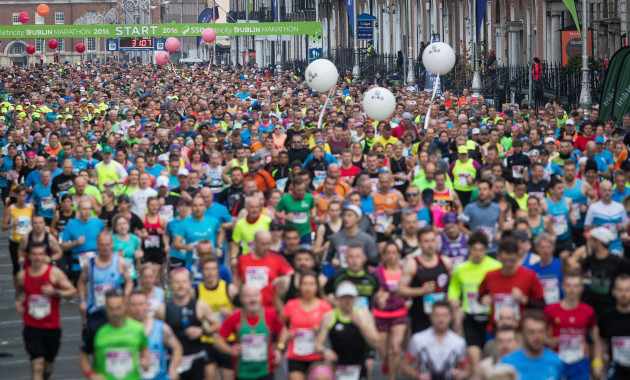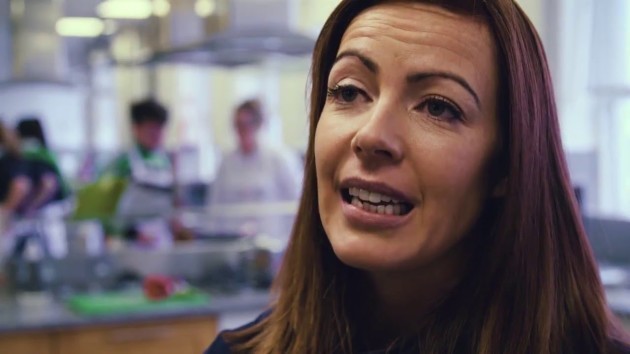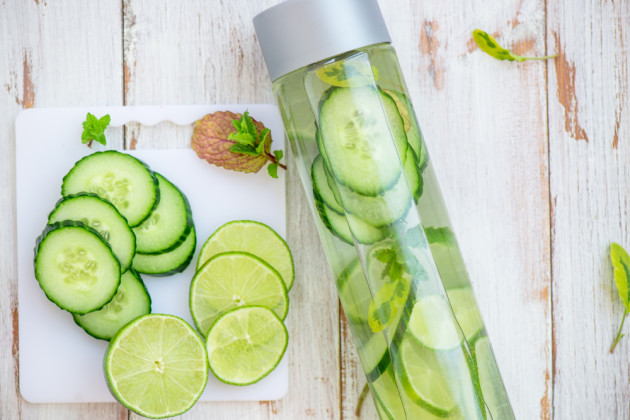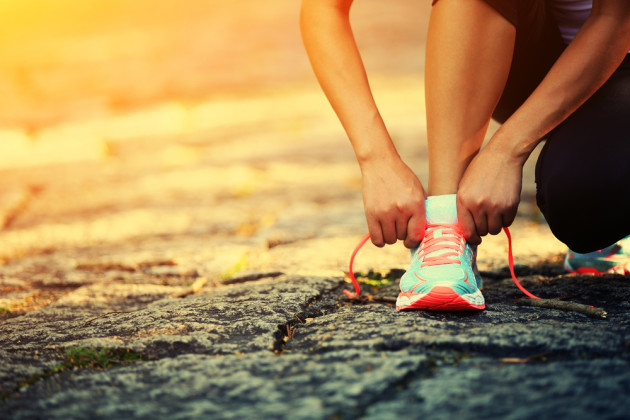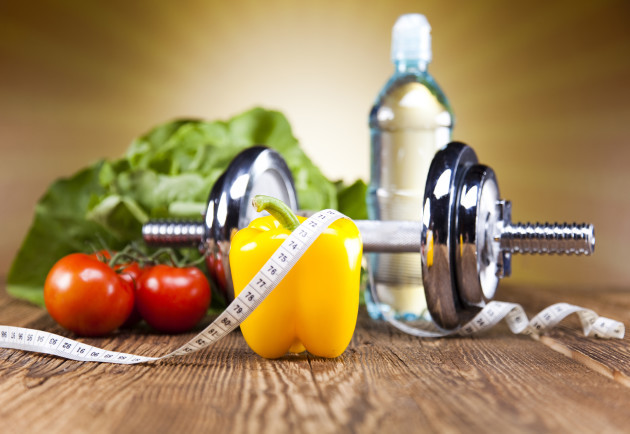FOUR DAYS TO go. But if you’re preparing for the Dublin City Marthon this Sunday, you hardly need reminding.
The training is all but done at this stage, with the final touches being applied.
In his column yesterday, personal trainer David Last brought you 8 tips to follow ahead of the big day. He touched on nutrition, but sports nutritionist Dr Crionna Tobin has kindly offered to share further knowledge in this, a piece dedicated solely to marathon nutrition tips.
With an undergraduate degree in Biochemistry, a Masters in sports nutrition and also a PhD from Dublin City University under her belt, she’s well versed to discuss the theoretical side of things.
Working full-time for Glanbia Performance Nutrition, Tobin also runs her own consultancy, Fuel and Perform, and has worked on a day-to-day basis with a host of different athletes and teams.
International marathon runners Maria McCambridge — two-time winner of the Dublin City Marathon — and Caitriona Jennings, who competed at London 2016, Brian Gregan, Conor Niland and Ciara Everard are among the athletes, while she’s plied her trade with the Galway footballers and hurlers, Dublin’s All-Ireland-winning team of 2011, the Dublin and Waterford hurlers and also Meath GAA.
“It’s not just about the food, it’s about teaching them life skills as well,” she tells The42.
“We have come a long way from when I started in the game 12 years ago. People see the value of nutrition now and how it can enhance their performance helping them to fuel and recover properly.
“I have great respect for all athletes, however the individual athlete, they are an awesome specimen. A team, they motivate each other. When you work with an athlete — particularly an endurance athlete –you really and truly understand how they have to self-motivate themselves, and you draw a huge amount of respect from that.
“I have the easy job of telling them what to do. In team sports, you can hide a little bit, but individual athletes really have to do it for themselves.”
And the same, of course, applies to those taking to the starting line on Sunday, with 26.2 miles ahead of them.
Tobin’s recommendations and tips are simple, and fairly easy to follow. You’ve probably heard some of it before, from the traditional buzz words of ‘carbing up’ to hydration routines, but there are some nuggets and timely reminders in here that will come in handy ahead of — and throughout — the big day.
1. Carbing up is important, but don’t get too carried away
“Traditionally, people would eat huge volumes of carbohydrate a week before the marathon,” she begins. ”We know it’s not really necessary for the majority of people.
“However, there should be a focus on carbohydrates 24-48 hours before the marathon. That might just be eating a little bit more, an extra tablespoon — which is a big-serving spoon — of carbohydrate with each main meal.”
So for breakfast, if you have porridge on a normal day, have an extra serving on top of that, or have porridge AND two slices of toast, or porridge AND a glass of orange juice.
For lunch, instead of just having a sandwich, have a bowl of pasta, rice or some potatoes as well, and again for your dinner, have an extra portion of whatever carbohydrate food you’re having (whether that be potatoes, pasta, sweet potato, quinoa, rice etc).
“Throughout the day, have carbohydrate-rich snacks,” she continues. “Have a smoothie, have a banana, have two slices of wholemeal toast with peanut butter.
“The athlete’s not going to be doing that much training, so instead of using the carbohydrate in the training session, they’ll be storing it in their muscle so they can use it for running the marathon. Carbohydrates gives the runner the fuel to run fast.
“The goal 24-48 hours before the marathon is fuelling and hydrating, therefore’health’ takes a back seat as white carbohydrates are superior to brown in this instance — you can eat more of them as they digest faster. This translates into more fuel in your muscle to run faster for longer.”
2. Hydrate, hydrate, hydrate
Hydration is obviously an important part of daily life, whether you’re training or not, but it’s huge in the lead up to Sunday. Especially in the 48 hours prior to the race, water is your best friend, Tobin adds.
“The easiest way to check your hydration levels is checking the colour of your urine. So every time you go to the toilet, make sure your urine is a light yellow colour, and that way you know you’re going to be hydrated.”
On the day then, start your hydration immediately when you wake up. All fluids hydrate but she recommends to focus on water and sports drinks, as much as possible. We’ll touch on it here, but further down, there’s a more in-depth guide to the day itself.
“Try to sip on fluids, a sports drink would give you not only water but also carbohydrate, it’s a good thing to have with you,” Tobin says.
“During the marathon — depending on how long it’ll take you to do it — I’d recommend if possible drinking 150-200 ml that every half an hour to 40 minutes, preferably a sports drink.”
You don’t want to hit the wall or ‘bonk’, and taking in more carbohydrate through a sports drink is key in avoiding that.
3. Don’t try anything new
We hear it over and over in the run up to the marathon, especially regarding training. But the same applies to nutrition habits, understandably.
This week, take a day and treat it exactly like Sunday. Nutrition-wise of course, don’t go running huge distances!
Set your alarm for the time you’ll have to get up at, start your hydration, eat what you’ll have for breakfast, and so on, so forth.
“Really try and practice your marathon day nutrition on a training day,” Tobin says. “I know it’ll be a very early start for many people because they have to travel, but you should try and do it on a day that you’re training.
“Get up at the time that you’re going to be getting up. Have your normal breakfast, stick to that. If you have a big bowl of cereal, a smoothie, whatever it’s going to be — have that.
“That and what you have eaten the day before is going to fuel you for your run.”
4. The night before, morning of and during the marathon
Here comes that ‘carbing up’ concept again.
Tobin continues: “The food that you have the day before is really going to fuel you for the marathon. That’s why we say increase your portion of carbohydrate because that’s the fuel that’s going to fuel you.
“Have something like a carbohydrate-rich snack before you go to bed. A bowl of cereal, slices of toast, a smoothie, a similar thing that you’d have for breakfast to snack on before you go to bed the night before.”
Sunday 29 October — the day you’ve all been waiting for.
As mentioned previously, begin your hydration immediately. Sip on water. Have your normal breakfast, the one that you’ve also trialed during the week.
Many people face quite the journey to Dublin, so bring some snacks for the road.
“It’d be great if you could make your own handmade granola bars,” she smiles. “If not, just focus on carbohydrate rich snacks. But be prepared, don’t resort to picking up a breakfast roll in a petrol station!
“The day of the marathon is about getting fuel into you. The main fuel source is carbohydrate, again it’s all about fuelling up and focusing on carbohydrate-rich food.
“After having your breakfast or something substantial 2-3 hours before the race, try to have a snack 60-90 minutes before the race starts; depending on how your gut reacts to that food. Some people might be a little bit nervous, even more of a reason to have a lot of carbohydrates the day before, and with your breakfast.
“If you could stomach it, try and have a white bread sandwich, even a granola bar, a banana — a banana is a really good source of carbohydrate and it’s easy to digest. Sip on fluids, a sports drink would give you not only water but also carbohydrate, it’s a good thing to have with you.
“Then you’re kind of good to go!”
During the marathon itself, Tobin echoes her earlier recommendation to sip on fluid, preferably a sports drink every half an hour to 40 minutes.
“You don’t want to bonk, you don’t want to hit the wall. If this happens your body has used up all its carbohydrate stores and it has to restore to using fat as a fuel source.
“When this happens your running intensity drops and running becomes more difficult. It usually happens to runners around mile 13.To prevent this, start eating or drinking carbohydrate in the form of gels, drinks or food, as early as possible during the race, 45 minutes into the race, to allow time for the carbs to be digested and available for the muscle to use as fuel.
5. Recovery is massive
Of course, all of the focus is on the marathon and what happens before it, but considering the plan of action for afterwards is important too.
“Recovery is really, really important and I would recommend that everyone recovers after. I know the temptation is to have something to eat very quick afterwards and then go for a few drinks. Whereas if you can recover, your body’s going to thank you the next day.”
It’s all about the three Rs, Tobin continues:
- Replacing the fuel that you’re using (carbohydrate)
- Repairing that muscle (protein)
- Re-hydrating — getting water/fluids (non-alcoholic ones!) into you
“You can do all of this with real food. Protein is key,” she concludes.
“After, the Dublin City Marathon packs provide granola bars, fluids, protein bars; you can take these on board to satisfy your short term recovery.
“But realistically you want to get something like a meal that’s going to give you good quality proteins, carbohydrates, fats and fluid into you afterwards to help alleviate those sore muscles on Monday.”
Subscribe to The42 podcasts here:
